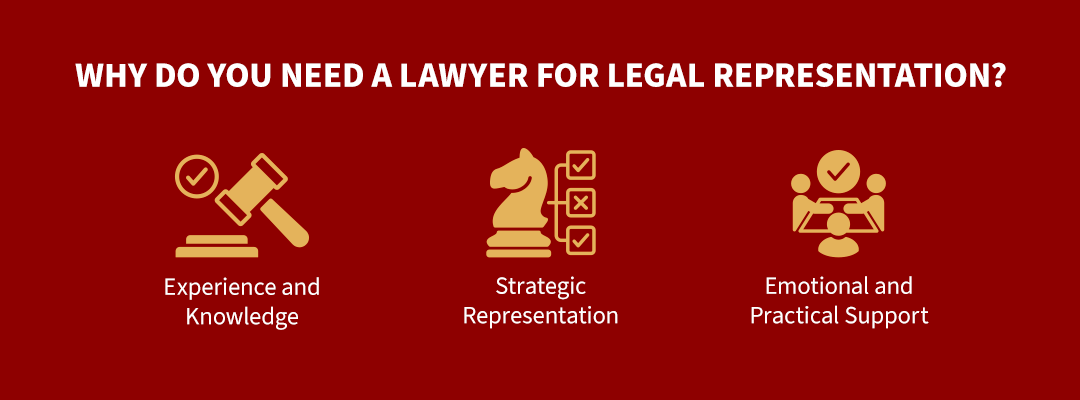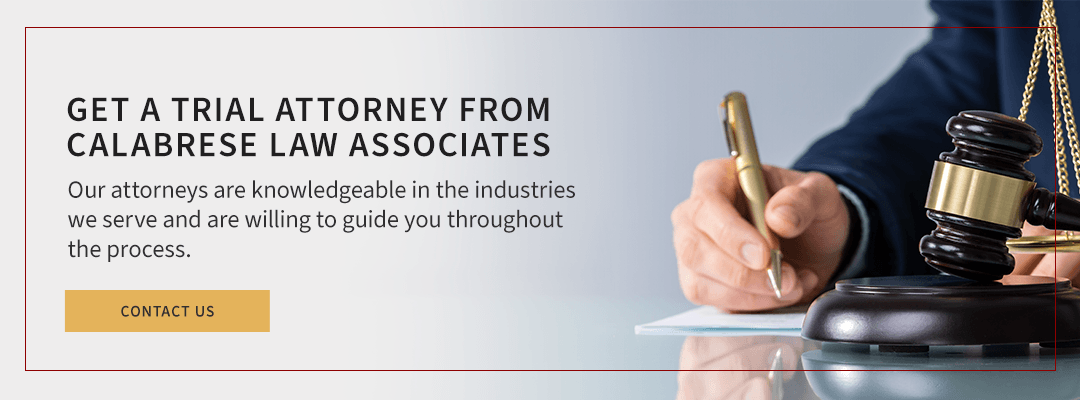Navigating legal disputes can be daunting and complex, which is why you need a lawyer. Trial lawyers have experience in litigation and can guide you throughout the process. They provide legal representation, handle the paperwork, and advocate for you. This article highlights crucial signs to determine when you need an attorney for an upcoming litigation and the value they bring. Reach out to the lawyers at Calabrese Law Associates if you have any questions.
What Is Legal Representation?
Legal representation is the professional assistance a lawyer provides to individuals or entities during legal proceedings. Professional representation makes it easier to navigate the complex judicial system and laws, protecting your rights and interests. Before going to court, the lawyer will assess your case to determine whether you have a valid course of action. A course of action is the combination of facts that enables a person to seek legal remedies in court. If you are being sued, the lawyer will help you build a defense.
There are various aspects of legal representation, including the following:
- Case preparation: The lawyer will likely dig deeper after you tell them your story. This assessment enables them to build a strong case and identify potential evidence.
- Filing relevant documents: Once the lawyer has enough information, they will draft the pleadings to commence or defend the action. The lawyer may also file motions, depending on the situation, to request something from the court.
- Advocacy: During litigation, the lawyer will argue and try to persuade the court to rule in your favor. Advocacy requires tact and skill. It involves presenting evidence and legal reasoning to support the claim or defense.
- Enforcement: The court will pass judgment after evaluating the law and facts. If you succeed, the lawyer will enforce the judgment against the losing party.
Litigation is technical, and partnering with a trial attorney increases your chances of success.
Why Do You Need a Lawyer for Legal Representation?
Lawyers provide many benefits in legal representation. Here are a few examples:
1. Experience and Knowledge
Lawyers understand the law and judicial system, which is crucial for success in litigation. They know the court processes, filing deadlines, and procedural requirements. Additionally, lawyers have insight into various industries, depending on the area of practice. Whether the dispute relates to contracts, real estate, construction, or corporate governance, an attorney can provide support.
2. Strategic Representation
Lawyers are trained to examine situations and develop legal strategies to help achieve the desired results. They look for strengths and weaknesses in the case and leverage the law and evidence to persuade the court. Their ability to anticipate outcomes is instrumental when developing a plan. Moreover, lawyers understand courtroom etiquette and the rules of evidence. They know the procedures for questioning witnesses and making objections. This experience allows them to navigate the complex judicial standards while making submissions on behalf of clients.
3. Emotional and Practical Support
Legal proceedings can be stressful and confusing. The uncertainty surrounding potential outcomes can cause anxiety, especially when you are concerned about financial losses or business disruptions. In such cases, a professional can help you make informed, logical decisions. Lawyers are skilled in managing the myriad details involved in legal proceedings. They support clients in challenging circumstances with a clear goal and plan. This strategy takes the load off your shoulders and promotes efficiency in litigation.
When Do You Need a Lawyer for a Civil Lawsuit?
Knowing when to hire a lawyer is essential to protecting your interests. Below are five signs to use as guidance if you anticipate ligation:
1. Complex Legal Issues
Seek legal assistance if your case involves complex legal issues. Does the matter require understanding intricate laws or regulations? Is there a precedent that goes against you? Does the matter relate to a niche area of law? Is there sufficient credible evidence to back your claim? Answering questions like these helps you determine whether your case is complicated. You can always consult an attorney to better understand the essence of your case, particularly if you have doubts.
2. High Stake Situations
Hire a lawyer when the stakes are high. Will losing the case result in a substantial financial loss or reputational damage? Does the other party nonchalantly and consistently violate your rights? How emotionally attached are you to the case? Evaluate the potential legal consequences and consider the value an attorney can bring. Having a skilled attorney conduct the trial on your behalf increases your chances of success. Most attorneys have experience handling complex, high-profile cases.
3. Unfamiliarity With Legal Procedure
Civil procedure is a technical area of law. It requires you to know specific rules relating to initiating lawsuits, serving processes on parties, presenting and challenging evidence, meeting filing deadlines, and so on. These rules may also vary depending on the court where the case is being heard, making things more complicated. Missteps in civil procedure can cause delays or even dismissal of your case.
Experienced trial attorneys know the nitty-gritty of civil procedure. They can guide you through each step, ensuring compliance with the rules. This support can prevent losing the case on technicalities.
4. Disputes With Multiple Parties
Does the civil lawsuit involve multiple parties, such as co-defendants, third-party claims, or class actions? These cases can be complex and challenging to manage. Disputes with multiple parties usually require coordination and strategic planning to address the different interests. An attorney can streamline the process by leveraging their knowledge and resources. They can manage correspondence between parties and develop solutions to mitigate potential conflicts or counterclaims.
5. Potential for Appeal
Do you foresee an appeal, or is the current matter an appellate case? If yes, consider hiring an attorney immediately. Appeals have distinct legal standards and procedures that differ from trial litigation. There is a limited time to file a notice of appeal, plus you must generally have compelling grounds of appeal if you lost at the court of first instance. An attorney can review the record of proceedings and help you prepare for the appeal.
What to Consider When Hiring a Lawyer for Court
There are several factors to consider when hiring a lawyer for court, including the following:
- Practice area: There are diverse areas of law, so choose an attorney who practices in the field that relates to your case.
- Experience: Consider the trial attorney’s experience in litigation, including the years of practice and track record.
- Reputation: Choose an attorney with a good reputation as professionalism reflects in the quality of representation.
- Client relationships: Select an attorney with excellent client relations, considering their responsiveness and personal rapport.
- Fee structure: Inquire about the fee and choose the ideal structure, depending on your needs.
Why Trust Us?
Calabrese Law Associates provides effective legal representation to individuals and entities in Massachusetts. Our trial lawyers have years of experience and knowledge of the judicial system. We serve clients with issues involving contracts, real estate, construction, corporate governance, and private investment. The firm is well-resourced, with skilled professionals ready to assist.
We pride ourselves on providing excellent, tailored services to our clients. We listen attentively and work with clients to develop helpful solutions. Our goal is to achieve outcomes that align with your needs. We are honest and transparent in all our dealings and comply with ethical standards and best practices.
The firm has close ties with residents of the Greater Boston Area. We form strong, long-lasting relationships with our clients and have earned awards through our efforts. We have outstanding reviews and testimonials, which motivates us to exceed expectations even more. Our track record in civil litigation is impressive.
Get a Trial Attorney From Calabrese Law Associates
Do you need an experienced trial attorney for an upcoming litigation? Contact us today. Calabrese Law Associates handles litigation for individuals and businesses — we can offer you the support you need. Our attorneys are knowledgeable in the industries we serve and are willing to guide you throughout the process.
This publication and its contents are not to be construed as legal advice nor a recommendation to you as to how to proceed. Please consult with a local licensed attorney directly before taking any action that could have legal consequences. This publication and its content do not create an attorney-client relationship and are being provided for general informational purposes only.
Attorney Advertising. Prior results do not guarantee a similar outcome.





